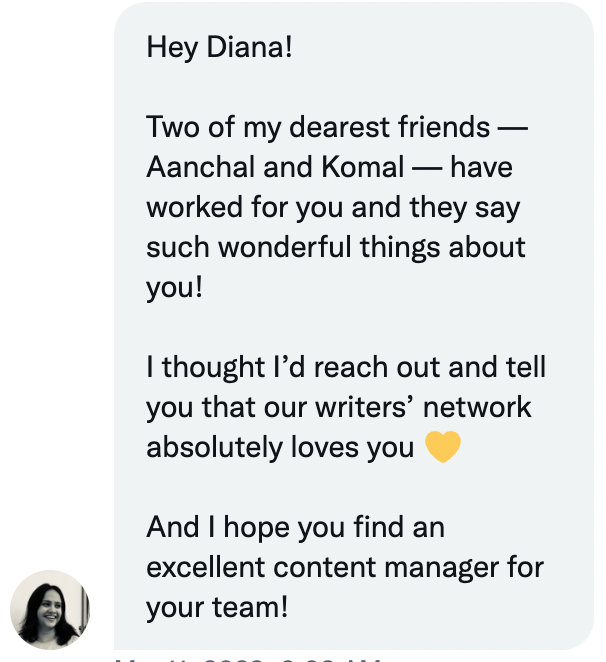I'm Diana, head of content at VEED—an online video editing startup. I've spotted patterns between great writers who are successful with their writing business and those who are good at writing but aren't necessarily keeping their work pipeline full.
For context:
- People who read the VEED blog make 4X more video content using VEED than those who don't (monthly active creators is one of our two growth north stars)
- I’ve personally hired and managed dozens of dozens of writers
- We currently have 157,000 monthly visitors on blog
- And our freelance writers love working with me

Here are eight things I've learned from the exceptional writers I've put on retainer so you can avoid the avoidable mistakes and succeed faster.
1. They’re not scared to ask a lot of questions
Inexperienced writers vomit yeses and change their mind to match yours as their replies anxiously grasp at a crumb of whatever might please you.
The worst habit a writer can have is being inauthentically agreeable due to a deeply rooted fear of questioning anything and owning their “hot takes”.
I get you don’t want to come off as annoying by asking too many questions. I used to be that person too so I know how paralyzing it can feel. But if you want to work with great clients on a recurring basis you need to produce work levels above everyone else.
And to do that you can’t afford to forfeit the clarity only answered questions can bring.
I’m known for writing detailed briefs and outlines. But if a writer doesn't ask me a single question about our content, our company, and our customers here’s what I can safely assume about them:
- They don’t have a process because they’re new and figuring their approach out therefore won't contribute much value if we work together
- They don’t care about writing that deeply because it’s just a paycheck to them and not a craft whose end result they’re truly passionate about (and how it reflects on their personal brand)
- They’re deathly shy and will never challenge me. They need to work past this if they want to work with high-paying clients and grow as a writer.
2. They’re never shy to spot problems (or things they disagree with) and pitch solutions or alternatives
One of the writers I often work with, added some details to a blog for VEED that I removed. From my perspective I was trimming off some fat.
But they decided to explain their reasoning as to why they added the section. They were able to make a well-explained case for their thinking which made me choose to keep it and instead restructure the order of ideas for better flow.
Sometimes I make bad calls and I firmly believe in my calls the moment I make them. Other times I make bad calls because my mental processing power is dulled down from having powered my way through so many words throughout the course of the work day.
Quick Note: I tried remembering which blog and writer this was to screenshot the comment as an example but it was near impossible to locate the draft and dig into resolved edits. 🙈
Content is a collaborative effort.
You might find a more effective way than I did to go from point A to point B in certain parts. And if that happens, don’t just tell me or your client there’s a problem.
And this is exactly what I love about you, D! You’re always open to why taking so and so route could be better. It makes content creation such a fun, collaborative process with you :)
— Masooma | Content Writer (@inkandcopy) August 30, 2022
Before I ever hand off a topic off to a writer I spend HOURS researching so I can make an outline and brief born from a well-educated POV (and sometimes even my own subject matter expertise depending on the topic).
If you disagree or spot a problem, always propose how to fix it. But don't just leave it at that...
If possible, include evidence to back up why you believe something should be done a certain way. People in a role like mine are more likely to listen if you can back up your reasoning with facts that show me you put work into your reasoning rather than just wanting words to live on a page because you “feel like it would be valuable”.
Feeling is not usually enough of an argument by itself.
Doing this not only helps make for better content but it makes working together a richer relationship for us both. In any relationship you have in life, communication is the not-so-secret ingredient to making magic together and overcoming all the roadblocks without losing your sanity in the process.
3. They have a valuable network (and marketing knowledge) due to learning how to market themselves
Note: This take is for writers who cover content that ties back into social media and content marketing.
You can read all the articles and take courses but there's a night and day difference between:
- Writers who market themselves and build relationships.
- Writers who don't invest time into their own marketing and network.
Personally, I strongly gravitate toward writers who market themselves considering VEED is an online video creation and editing tool where our customers actively post to social media.
To be clear, I'm NOT expecting writers to have 10K+ followers. Although I admit, this can sometimes be a bonus depending on the relationships they've built and how relevant they are to content initiatives I’m working on.
Because so much of our content covers social media best practices around video, there's only so much I can explain in a brief without writing a whole book. I don’t mind having to add bullet points with context details only an expert would know. But I admit it’s a relief when I know the writer I’m working with knows as much or more than I do about the content-related topic we’re covering.
For example, the vast majority of content about social media ranking on SERPS is garbage (in my opinion as someone with a social media background) even when it comes from big-name brands and publications you’d think know better. It helps if writers know how some platforms work from experience and not just reading blogs and asking around.
Knowledge from personal experience is a secret spice that helps your content be unlike anyone else’s.
Now let's talk about a writer's network:
There are loads of great writers trying to be seen. But writers who can charge more are often more than "just" a good writer, they're well connected and lifelong learners who can provide a better service than the rest.
And when I make a decision I ask myself a few things around whether or not this person would make some parts of my job easier.
- Are they connected to interesting people who can contribute value to an article?
- Do they write for high-authority sites and could help facilitate an introduction or build links for us (and their client) in blogs they write?
Because I’ve focused on working with writers who value building their network I’ve been introduced to other great writers, content collaboration opportunities, and gotten a backlink here and there thanks to writers plugging in links to relevant content in posts they’re writing for other authoritative sites.
4. Their DMs and emails are as well-structured and effective as their blogs
If a writer sends a messily structured 2,000-character message that could've been 500 characters that tells me everything I need to know about how they’d self-edit a rough draft for a 2,000 word blog.
Every strong writer I've worked with has sent me a direct message that’s easy to read and act on.
The writers whose skill set isn't quite there yet have sent painfully long messages listing off everything they've ever done, thought, and make several asks of me in a single intro message.
While there are surely THOUSANDS of amazing things about you, no stranger wants to read all of them
…at least not in the first interaction.
Condense your message so you highlight the 1-3 most impressive factors about you and your work. And then, look at how you structured the words and ideas in your message.
And please never apologize for pitching yourself.
If you're in someone's inbox to pitch your work it's because you think your work is great and worthy of their attention. Apologizing for existing in my inbox downplays your worth and makes me assume you’re not experienced enough to be confident in your abilities and value as a writer.
As a writer, your written communication will be judged more harshly as an indicator of the quality of your work (especially in the first interaction). Make it easy to engage with you and don’t be afraid to speak highly of yourself to start paving the way towards trust.
5. They’ll find ways to know how their content performed even if performance isn’t entirely within their control
When asked for samples and a brief explanation about why those samples are your best work, anybody can say:
- I write a lot about A, B, C
- The client said they really liked it
- I did lots of research on this blog
But not enough writers can answer questions about how their work contributed to an end result such as:
- Are you ranking #1 or in the top 5 of SERPS for any target keywords?
- Is your blog picking up a substantial amount of backlinks?
- Did you write the highest converting blog?
- How much traffic is your content driving?
- How about social shares and virality?
I understand you might not have direct access to performance metrics. And perhaps some of these details the client chooses to keep confidential.
But from my personal experience, I find most writers never bother to ask for them anyway. I’m not sure if it’s because they’re nervous about it or it just didn’t cross their mind.
Take for example this quick update I created for Mako, one of our writers. I'm happy to share this not only to help writers build their portfolios but also to help them see what great content they’ve produced for us looks like.
I believe writers are more motivated to consistently do great work when they not only know they're appreciated but also get to see how their work made an impact.
While neither a writer nor myself have full control over a piece of content’s performance due to how many factors influence this, we all played a role in its success.
If you don't ask you'll definitely never get. The worst that can happen is you get a 'no' and move on to find clients who will be more generous with this information.
Masooma Memon, one of the first writers I worked with and still work with to this day, is an excellent example of someone with a well-presented portfolio.
Let’s look at Masooma’s home page.
Here’s everything I learned above the fold of her home page:
- She’s a freelance B2B SaaS writer
- Can write new and refreshed long-form content like guides and case studies
- Has an understanding of SEO and making content that dominates SERPS
- Shows me where I can see more of her work
- Shows me all the impressive clients who trust her to write for them
And if I scroll down just a bit more, here’s what I learn:
- Even more impressive names she’s worked with
- A testimonial from some of these impressive names to show she’s not a one-time writer for them but someone they liked enough to keep on hiring her
Other notable mentions on Masooma’s website and things she links out to:
- Her about page shows me content that has ranked on SERPS and that she’s particularly proud of.
- A link to Notion takes me to a full database of content she has written sorted by the different verticals and highlighting pieces she’s written for her clients.
6. They pay attention to “little” details which positions their services miles ahead of everyone else
I rewrote this 7 to 10 times because it made me sound like a crazy perfectionist who’s difficult to work with. But I’m only human. When I see a writer routinely does not follow instructions I’ve painstakingly laid out I get frustrated.
I wish I could say the best briefs are actually brief.
But I've found my more detailed briefs give the writers I work with the clarity and confidence to focus their efforts and creativity in the right direction.
What's in a content brief?
— Diana Briceño (@dianagetssocial) August 9, 2022
Here are a few staples I typically include in briefs and outlines for @veedstudio writers along with...
1) What the staples answer for writers
2) Why do they matter to everyone involved
(cont. below)
My content briefs and outlines are a map for success. And in a brief, there are often links to things such as:
- Guidelines and style guide
- Things to read for context
- Related terms to include
- Formatting instructions
- Original research
I expect writers who produce quality content hold themselves to a high standard.
During my first 3 months of hiring VEED's first writers, I kept feeling like some articles weren't the product of someone who read the brief.
I always point fingers back at myself first so I'm like okay...how did I fail this writer? What can I do better?
But I soon realized I can do all the right things but I can't fix someone else's laziness and lack of commitment to excellence.
I’m not a perfectionist. In fact, I still have a lot of this older content up that needs fixing (which is why at the time of writing this I'm hiring a managing editor). No writer is perfect or privy to the things only someone who's worked with our brand for a while knows about our audience and content.
But I absolutely expect to see progression. If a writer does not progress it tells me they’re closed off to growth due to their inability or difficulty to be coachable.
I’ve noticed the following about coachable writers:
- They keep logs of feedback I've given to avoid making the same mistakes
- They ask me how they're doing and how they could do better
- I can see improvement the more we work together
- They don't take edits personally
After I realized some people get “comfortable” from the get go (or after a couple articles together), I began to randomly NOT grant access to the documentation inside the briefs on purpose. It became a quick and easy way for me to know which new (and existing) writers lack the thoroughness we need and who lies about having looked at the brief.
For the record, I don’t enjoy doing this. I want you to win and not be caught up in an avoidable stupid big mistake. But I need to avoid unnecessary headaches and nip things in the bud as quickly and reasonably as possible.
7. They’re masters of self-awareness in order to set and manage expectations with their clients
The best writers own their time and have the self-awareness to know how much work they can realistically take on. They don't (or rarely ever) overextend themselves at the expense of sacrificing the quality of the client's work.
Instead, they know exactly how they need to operate to not only make their clients happy but also feel fulfilled by the work they do and how they do it.
They also don’t take on work that’s not aligned with the brand perception and type of client they want for themselves.
In any field—it takes time to get to this point where you have the luxury of taking a select number of clients, turning down work, and raising your rates because you have the track record and demand to back it.
Now for turnaround time…
If I had a penny for every writer in my inboxes who pitches me a 24-hour turnaround time I'd have a potato sack full of coins 🤣
If a client wants a quality writer to deliver faster then in that case you should:
- charge a rush fee to bump the priority level up
- make sure you communicate the rush fee before signing to avoid pricing surprises that fracture any built trust
But time in itself normally doesn't speak to the quality of your work.
Anyone can type a bunch of words into a mediocre piece of long-form content. But a small number of people know how to deliver quality and quality normally takes way more than 24 hours.
8. They’re entrepreneurs who know how to price their work and simply explain it
If understanding a writer's pricing structure feels like deciphering Geoffrey Chaucer’s The Canterbury Tales I just don’t want to deal with the confusion piece after piece, month after month.
And it’s not because I’m lazy or scared of big numbers.
It’s just some writers are vague about how they charge and come up with a ginormous breakdown that does anything but simplify and clarify things. This makes it so hard and time consuming for me each time I need to figure out the cost and then communicate it to our HR for our freelancer agreements and monthly payouts.
Maybe you charge…
- Per word
- For a word count range (e.g. a price for articles ranging 1,500 to 2,000 words)
- Based on retainer for a certain number pieces up to a certain word count and charge per word if you go over the agreed-upon word count (e.g. $1,800 for two blogs up to 3,000 words and .30 cents/word over 3,000 words)
It’s important you know your worth and bill for this accordingly. But you also need to make it easy to understand how you price your work to avoid confusion and surprises.
There’s also something weird I’ve noticed on “writing Twitter”.
Freelance writers get understandably upset when they’re paid little.
But you are an entrepreneur who decides their pricing and the clients you will and will not take. If you don’t try to negotiate and settle for pennies as someone who has the experience and track record then you are a victim of your own bad decisions.
I hate to say this but it’s true if you have a valuable portfolio.
It’s not enough to write well. When you’re responsible for keeping your own sales pipeline full so you can pay the bills it becomes your responsibility to learn…
- How to price yourself and the psychology of pricing
- How to network and find higher-paying clients
- How to negotiate better
- How to market yourself
- How to run a business
If you’re just getting started it’s usually normal to charge a bit less until you’ve built evidence (your portfolio) demonstrating your expertise. You’re in the era of being neck-deep in the pits of your freelancer education while proving yourself as an up and coming writer.
If you were an employee you’d be more limited by departmental budgets for your salary range.
And as a freelancer your earning potential is virtually unlimited.
But although the sky's the limit with freelancing, there’s no pot of gold patiently waiting for you at the end of the freelancer rainbow just because you can write well. Yes you are a writer but it’s time you view yourself as more than that.
You are your own boss. What do you need to do so your writing business is thriving?
This is a blog I’ll continuously be adding to the more I learn. If you gained any valuable insight today from this piece I would be absolutely ecstatic if you’d give it a share so we can help more writers out there. ❤️







